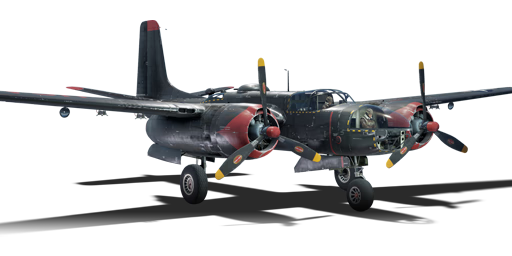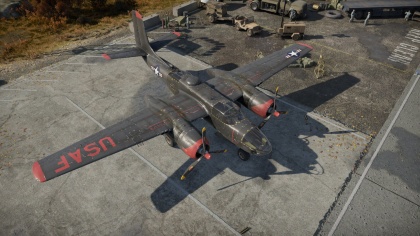A-26C-45DT
Contents
| This page is about the American bomber A-26C-45DT. For other uses, see A-26 (Family). |
Description
The A-26C-45DT is a gift rank American bomber
with a battle rating of (AB), (RB), and (SB). This bomber has been in the game since the start of the Open Beta Test prior to Update 1.27. It has since been modified to be a PlayStation 4 exclusive vehicle obtained by buying a pack.
With speed, manoeuvrability and large hitting power, the A-26 should not be taken lightly. Although players may find the battle rating too high, this isn't the case- in fact, it may be about right. The plane has a cruise speed which all the piston engine bombers dream of and is currently unmatched in the game. Reaching a maximum speed of 568.8 kph the Invader is faster than the comparable Tu-2 by a significant 202 kph. This speed allows the A-26 to strike targets deep in enemy territory and early on better than any other aircraft (excluding the jet aircraft). It also has a 4,000 lb payload with a variety of load-out options, making it very versatile in its role, allowing it to attack many different targets with great efficiency. To add to this, it has 8 x Browning M2 .50 cal machine guns to attack soft targets and the unfortunate jet if you have the chance. Unlike the Mosquito, the A-26 has defensive gunner turrets and decent ones at that. With two twin M2 machine gun remote turrets it allows for the very accurate and deadly fire.
General info
Flight Performance
Describe how the aircraft behaves in the air. Speed, manoeuvrability, acceleration and allowable loads - these are the most important characteristics of the vehicle.
| Characteristics | |||||||
|---|---|---|---|---|---|---|---|
| Stock | |||||||
| Max Speed (km/h at 4,573 m) |
Max altitude (meters) |
Turn time (seconds) |
Rate of climb (meters/second) |
Take-off run (meters) | |||
| AB | RB | AB | RB | AB | RB | ||
| 536 | 523 | 8,000 | 29.3 | 30.3 | 7.8 | 7.8 | 700 |
| Upgraded | |||||||
| Max Speed (km/h at 4,573 m) |
Max altitude (meters) | Turn time (seconds) | Rate of climb (meters/second) |
Take-off run (meters) | |||
| AB | RB | AB | RB | AB | RB | ||
| 607 | 569 | 8,000 | 27.0 | 28.0 | 19.7 | 11.4 | 700 |
Details
| Features | ||||
|---|---|---|---|---|
| Combat flap | Take-off flap | Landing flap | Air brakes | Arrestor gear |
| ✓ | ✓ | ✓ | X | X |
| Limits | ||||
|---|---|---|---|---|
| Wing-break speed (km/h) |
Gear limit (km/h) |
Combat flap (km/h) |
Max Static G | |
| + | - | |||
| 718 | 257 | 420 | ~4 | ~3 |
| Optimal velocities | |||
|---|---|---|---|
| Ailerons (km/h) |
Rudder (km/h) |
Elevators (km/h) |
Radiator (km/h) |
| < 392 | < 375 | < 480 | > 280 |
| Compressor (RB/SB) | ||
|---|---|---|
| Setting 1 | ||
| Optimal altitude | 100% Engine power | WEP Engine power |
| 457 m | 4,000 hp | 4,740 hp |
| Setting 2 | ||
| Optimal altitude | 100% Engine power | WEP Engine power |
| 3,114 m | 3,200 hp | 3,792 hp |
Survivability and armour
Examine the survivability of the aircraft. Note how vulnerable the structure is and how secure the pilot is, whether the fuel tanks are armoured, etc. Describe the armour, if there is any, and also mention the vulnerability of other critical aircraft systems.
Armaments
Offensive armament
The A-26C-45DT is armed with:
- 2 × 12.7 mm Browning M2 machine gun, nose-mounted (400 rpg = 800 total)
- 6 × 12.7 mm Browning M2 machine gun, wing-mounted (300 rpg = 1,800 total)
Suspended armament
The A-26C-45DT can be outfitted with the following ordinance:
- 14 x 127 mm HVAR rockets
- 20 x 100 lb AN-M30A1 bombs (2,000 lb total)
- 10 x 500 lb AN-M64A1 bombs (5,000 lb total)
- 4 x 1,000 lb AN-M65A1 bombs (4,000 lb total)
- 2 x 2,000 lb AN-M66A2 bombs (4,000 lb total)
Defensive armament
The A-26C-45DT is defended by:
- 2 x 12.7 mm Browning M2 machine gun, dorsal turret (500 rpg = 1,000 total)
- 2 x 12.7 mm Browning M2 machine gun, ventral turret (500 rpg = 1,000 total)
Usage in battles
Use the A-26 to deliver fast tactic based strikes. In the first minutes of the game plan your route and decide on your key targets, the basics you want to include are:
- Focus on large amounts of Heavy/ medium targets
- Stay away from the main dogfights
- Follow paths that don't cross the normal enemy climb routes
- Utilize terrain as cover where ever possible
The best targets to choose are the "heavy" or "medium" targets at the far sides of the map or away from the main routes taken by the enemy. This is because they have a distinctive effect on the battle but also give large rewards post-game allowing for quick research/ progression with the advantage of you being to strike more targets before the fighters arrive. On your approach you want to the air spawn to gain speed in a dive then stay low. By staying low you take advantage of the spotting system at you become harder to spot and gain a marker (because if you do, your 60% dead). It also allows you to be masked by the terrain.
The payloads allow for attacks against many targets with great efficiency. Each bomb load has it's preferred target type to create the most damage which is noted as follows:
- 8 x 500 lb- Best for attacking medium to heavy ground targets, destroy the easier, stationary, pillboxes where possible over tanks
- 4 x 1,000 lb- Best for anti-shipping, specifically cruisers and battleships (Carriers are too armoured* and destroyers or Cargo ships would be overkill)
- 2 x 2,000 lb- Best for carriers and bombing points.
The stock payload is 20 x 100 lb bombs. To make use of these, drop 2-3 bombs at a time on a medium armoured target however move onto the higher payloads when possible. A tip for bombing in the A-26 is to release half a second before the crosshairs move over the target. This is to compensate for the bomb doors opening then the bombs being released. However, you can also use these to hit soft targets if you so want to.
- Carriers can be knocked out however accuracy is needed. Firstly take note of there the island is (the tower) while from a safe distance. Then maneuver in to a path that will be adjacent to the carrier and with the island facing you. Release two 1,000 lb bombs into the island and it should kill the carrier.
Manual Engine Control
| MEC elements | ||||||
|---|---|---|---|---|---|---|
| Mixer | Pitch | Radiator | Supercharger | Turbocharger | ||
| Oil | Water | Type | ||||
| Controllable | Not controllable | Not controllable | Not controllable | Separate | Not controllable | Not controllable |
Modules
| Tier | Flight performance | Survivability | Weaponry | ||
|---|---|---|---|---|---|
| I | Fuselage Repair | Radiator | Offensive 12 mm MGs | SBC mk.I | |
| II | Compressor | Airframe | New 12 mm MGs | FRC mk.5 | |
| III | Wings Repair | Engine | Turret 12 mm | MBC mk.1 | |
| IV | New 12 mm MGs (turret) | LBC mk.1 | |||
Pros and cons
Pros:
- Currently the fastest twin piston-engine bomber/attacker in the game
- Excellent rate of climb for a plane its size
- Wing mounted .50 cal machine guns allow for strafing of soft ground targets
- Capable of outrunning some enemy aircraft at sea level
- Payload efficient (max 4,000 lbs) to deal with most objectives
Cons:
- Gunner vulnerable to getting knocked out
- The wing mounted guns make it hard to hit anything outside your convergence zone
- Can meet jet-powered aircraft in-game
- Difficult to manoeuvre at high speeds
- Low service ceiling makes high altitude bombing discouraging
- Weak rudder control
History
Douglas A-26C-45-DT Invader is a twin-engine medium bomber/ground-attack aircraft. An all-metal monoplane with a retractable landing gear system including a nose wheel. The crew consisted of three people. The plane was designed in the design bureau of Douglas Aircraft Company under the direction of Edward Heinemann and Robert Donovan. The ХА-26 prototype made its first flight on July 10, 1942. Mass production began in September 1943.
The А-26С variant was a medium bomber with a glazed navigator's cockpit in the nose section. The navigator's cockpit had a Norden M-9 bombsight for medium-altitude precision bombing.
А-26С bombers were equipped with two 2000 hp Pratt & Whitney R-2800-27 Double Wasp fourteen-cylinder, double-row, radial air-cooled engines. The aircraft's armament consisted of two fixed 12.7 mm Colt-Browning ANM2.5 machine guns in the forward fuselage and two remote-controlled turret mounts housing twin 12.7 mm Colt-Browning ANM2.5 machine guns with 500 rounds each. The turrets were located above and below the fuselage. The upper turret was able to turn 360 degrees and, if needed, fire forward. The А-26С could carry up to 4,000 lb (1,814 kg) of bombs loaded inside. The maximum bomb capacity of the aircraft was 5,000 lb (2,271 kg).
The А-26 was criticized by its operational pilots for poor visibility from the pilot's cockpit, and so, beginning with the А-26C-30-DT series, it obtained a new pilot's cockpit canopy.
Beginning with the А-26C-45-DT series, the aircraft had Pratt & Whitney R-2800-79 engines with a methanol-water injection system, six wing-mounted 12.7 mm Colt-Browning ANM2.5 machine guns, and enlarged fuel tanks. Also, the plane could have unguided rockets suspended under its wings.
The А-26's first combat mission took place in May 1944 over New Guinea. In September 1944, the aircraft entered service with the USAAF units in Great Britain, and in January 1945, in Italy. Beginning in July 1945, А-26 aircraft were used in action in China and on the Japanese Ryukyu Islands.
Europe became the main theatre of war for the А-26. With a flight speed comparable to that of the German interceptors and with its strong defensive armament, the А-26 could operate without any fighter cover. Its powerful engines and good wing flap system made it exceptionally manoeuvrable. The А-26 Invader was certainly the most advanced bomber in its class by the end of the war.
A total of 1,091 A-26C bombers were factory-built, including five in Long Beach, California, and 1,086 in Tulsa, Oklahoma. All of the aircraft that rolled off the production line at Long Beach had the code DL, while the machines made at Tulsa were designated DT.
Media
Excellent additions to the article would be video guides, screenshots from the game, and photos.
See also
- Related development
- Douglas A-20 Havoc
- Aircraft of comparable role, configuration and era
External links
| USA bombers | |
|---|---|
| Dive | SB2U-2 · SB2U-3 · SBD-3 · SB2C-1C · SB2C-4 |
| Torpedo | TBD-1 · PBY-5 Catalina · PBY-5A Catalina · TBF-1C · BTD-1 |
| Medium | B-10B · B-18A · B-34 · PV-2D · B-25J-1 · B-25J-20 · A-26C-45 · A-26C-45DT · B-26B |
| Heavy | B-17E · B-17E/L · B-17G-60-VE · PB4Y-2 · B-24D-25-CO · B-29A-BN |
| Hydroplanes | OS2U-1 · OS2U-3 · PBM-1 "Mariner" · PBM-3 "Mariner" · PBM-5A "Mariner" |





